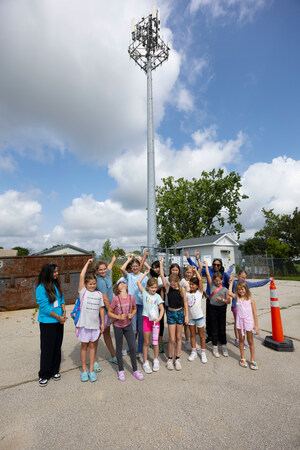CHICAGO, March 14, 2022 /PRNewswire/ -- According to a recent UScellular survey, almost half of students agree that pursuing a degree/career in a STEM-related field would be too costly or too difficult.
After further exploration into barriers, the survey revealed about 40% of students feel STEM careers aren't welcoming to women, and almost half think there isn't enough racial diversity in the STEM workforce.
The survey showed that most families aren't engaging in STEM outside of school. Both students (86%) and parents (94%) agree that STEM is important, however fewer than one in five students participated in any STEM extracurriculars in the past year, largely due to needing more fun and engaging activities (13% of students) to boost interest.
"UScellular is focused on addressing STEM education gaps by investing and offering resources to help ensure K-12 youth have equitable opportunities to pursue successful careers in STEM," said Denise Lintz, vice president, enterprise portfolio management and technology shared services at UScellular. "While many parents seem willing to assist their children with STEM learning, our survey revealed that parents who are college-educated (81%) or in STEM careers (93%) are more likely to engage their children in STEM enrichment than parents with less education (66%). This is why we are excited to be working with Girls Who Code to expand STEM access to all girls."
Unsurprising to UScellular, there is a significant gender gap in STEM as well. Male students have a higher participation than females in coding (27% vs. 9%) and robotics (16% vs. 8%). To help ensure youth have equitable opportunities to pursue successful careers in STEM, UScellular has teamed up with Girls Who Code and donated $150,000 to open five new Girls Who Code clubs in Kansas, Oklahoma, Virginia and Maine to help increase access to future opportunities, especially among young women. Girls Who Code is an international nonprofit organization working to close the gender gap in technology, and the new UScellular-sponsored clubs will be the first for Girls Who Code in these areas.
UScellular and Girls Who Code Offer STEM Career Paths and Advice
Girls Who Code's CEO, Dr. Tarika Barrett sat down with UScellular's Lintz in a candid conversation about their own career paths, advice for students and parents on pursuing a career in STEM, and what people may be surprised to learn about STEM professions. To see the full video, click here.
Dr. Barrett shared, "It is so critical for young people to understand that these are jobs that pay. STEM jobs pay 26% more than other careers. And beyond that, careers in STEM can be creative, fun and challenging. Our focus as an organization is making sure that every single program that we run at Girls Who Code creates a pathway that's accessible to every student we're trying to reach, no matter what their background is."
Additional key findings from the survey include:
STEM Understanding and Perceptions:
- Students and parents feel that a STEM education is good for your career, with 71% of students and 74% of parents agreeing that a STEM-focused education provides greater career opportunities. However, a significant number also don't know enough about the opportunities a STEM education would afford (48% of students; 41% of parents).
- Both audiences are more likely to associate STEM with traditional sectors, including:
- Science and tech (67% of students; 58% of parents)
- Computer science (58% of students; 47% of parents)
- Architecture/engineering (45% of students; 33% of parents)
- Only 13% of students and 9% of parents associated farming, fishing, forestry with STEM-indicating a lack of awareness among new STEM related fields that have evolved in recent years.
Parents Have Greatest Influence on Child's Career Path:
- Students relate that 49% of parents/guardians have the most influence on their academic interests, followed by other family members (37%) and teachers (36%).
- Students have high interest in some STEM fields, but they feel their parents have a stronger interest in medical (31%) or legal pursuits (20%).
How Urban vs. Rural Can Impact STEM Familiarity:
- Parents in urban areas are significantly more familiar with STEM than parents in rural areas (81% vs. 68%), as well as currently working in a STEM field (35% vs. 19%).
- White parents (73% vs. 68% of all other ethnicities combined) and urban parents (75% vs. 66% of rural parents) agree that STEM workforce is accessible to everyone, and a STEM-focused education provides greater career opportunities.
- In contrast, Hispanic parents agree significantly more that pursuing a STEM degree would be too costly and would be too difficult for their children.
- Significantly more urban students feel pursuing a degree/career in STEM would be costly, compared to students in rural areas (52% vs. 43%).
- Parents in urban areas are more confident they can help their children with math and science homework than parents in rural areas (78% vs. 70%).
- Despite both demographics believing STEM to be important, students in urban areas are significantly more familiar with STEM than students in rural areas (84% vs. 72%).
Since 2009, the company has donated nearly $21.4 million along with countless experiences and technology items to nonprofit organizations across the country. To learn more about how UScellular's community impact initiatives, visit newsroom.uscellular.com/community/.
About the Survey
UScellular's survey was fielded online by Hall & Partners from November 11 – November 29, 2021, among 1,000 parents and 1,000 students (18-25 years old) across a national footprint, with a margin of error of [+/- 3.2%].
About UScellular
UScellular is the fourth-largest full-service wireless carrier in the United States, providing national network coverage and industry-leading innovations designed to elevate the customer experience. The Chicago-based carrier provides a strong, reliable network supported by the latest technology and offers a wide range of communication services that enhance consumers' lives, increase the competitiveness of local businesses and improve the efficiency of government operations. To learn more about UScellular, visit one of its retail stores or www.uscellular.com. To get the latest news, visit newsroom.uscellular.com. Connect with UScellular on social media at facebook.com/uscellular, twitter.com/uscellular, instagram.com/uscellular, YouTube.com/uscellularcorp and linkedin.com/company/uscellular.
About Girls Who Code
Girls Who Code is an international nonprofit organization working to close the gender gap in technology, and leading the movement to inspire, educate, and equip students who identify as girls or nonbinary with the computing skills needed to pursue 21st century opportunities. Since launching in 2012, Girls Who Code has reached 450,000 students through our in-person and virtual programming and we have nearly 90,000 college-aged alumni. We have sparked culture change through marketing campaigns and advocacy efforts, generating 13 Billion engagements globally. In 2018, the organization was named the #1 Most Innovative Non-Profit on Fast Company's Most Innovative Companies list. Follow the organization on social media @GirlsWhoCode.
Media Contact:
Bridget Ballek
[email protected]
SOURCE UScellular

WANT YOUR COMPANY'S NEWS FEATURED ON PRNEWSWIRE.COM?
Newsrooms &
Influencers
Digital Media
Outlets
Journalists
Opted In






Share this article